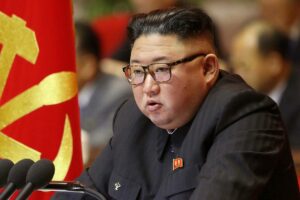Seijiro Udo, the founder of Udo Artists, Inc., one of Japan’s oldest and most important concert promoters, died Oct. 15 at the age of 92, according to the Udo home page. The cause of death was reported as “old age.”
Udo Artists was one of the first concert promotion companies to bring well-known Western pop and rock artists to Japan, and over the years has exclusively handled some of the biggest names in show biz: KISS, Bob Dylan, Van Halen, Aerosmith, Billy Joel, George Harrison, Toto, The Who and Prince (who once sang “Happy Birthday” to Udo during one of his concerts in 1989).
In particular, the company had long-term, close relationships to classic rock guitar gods like Carlos Santana, Jeff Beck and Eric Clapton, who has played more than 100 concerts at the Nippon Budokan under the Udo aegis.
Udo, who was known affectionately by the artists he represented as “Mr. Udo,” started in the business in his 20s working for Kyodo Kikaku, a concert planner, and started Udo Artists on his own in 1967.
Eric Martin, singer for Mr. Big, whom Udo made superstars in Japan, posted on Facebook: “He was our hero and savior for years. Mr. Udo and his crew made our band BIG in Japan, no question about it…He was the last of Giants.”
‘Rental War’ Rages Over Concert Space
Though South Korea is presently planning and building a number of venues that can accommodate large-scale concerts, for the moment, at least, the country’s music industry finds itself desperate for both medium-sized and large halls as demand heats up for concerts following the pandemic. Consequently, according to K-pop fan site Koreaboo, there is a “rental war” going on for concert space.
As an example, the site lists three major K-pop concert series that will take place at the 10,000-capacity KSPO Dome in Seoul, which is the former Olympic Gymnastics Stadium, between Oct. 27 and Nov. 26. Two of the artists put on similar concert series last year, but at much larger venues – the Gocheok Sky Dome and the Olympic Main Stadium. As a result, each artist must perform six shows at KSPO to reach the same number of fans that fewer shows could reach at the larger venues, thus tying up KSPO for a full month.
To make matters worse, Seoul’s Jamsil Sports Complex, another large-scale venue, is currently undergoing renovation and the Gocheok Sky Dome is already booked for a variety of sporting events after which it will also undergo repair work in December. Sangam World Cup Stadium is, for the time being, off-limits to concerts because of “turf issues.”
Koreaboo says the upshot is the number of halls available to major artists has become limited, a situation that especially affects foreign artists, many of whom it has been reported are avoiding Korea on their upcoming world tours because appropriate venues cannot be secured. One example cited was Post Malone, who played Korea in September but couldn’t find a venue big enough in Seoul, and so used an exhibition hall in Ilsan that could hold 30,000.
For years, major music acts used sporting facilities to stage concerts, and the operators of these facilities have obligations to sports organizations. Concerts can only take place when no sporting events are scheduled, and as demand for large-scale concerts skyrockets, the availability decreases.
Many in the industry are calling for some kind of ongoing consultive body between the worlds of sports and culture to work on the problem until planned, new concert halls have been constructed.
Can ‘Luxury Brand’ Backfire?
Singapore’s new image as the “luxury brand” destination for concerts in Southeast Asia could backfire on the city, according to a report from Channel News Asia.
One concert promoter told CNA that Singapore has been dubbed the “LV destination” for concert tourists, with LV standing for “Louis Vuitton,” one of the most recognizable luxury fashion brands in the world. That’s because Singapore offers “venues with state-of-the-art facilities, supportive policies and a clean and safe environment.”
Even more than for tourists, these features appeal to artists and touring management com-panies. This year saw three of Asia’s biggest tours – Jay Chou, BLACKPINK and Jacky Cheung – holding forth in Singapore for multiple nights, with Cheung settling in for a massive 11-show run in July. Early next year,
Coldplay and Taylor Swift will each do six nights at the National Stadium, and it will be Swift’s only appearance in Southeast Asia.
Singapore’s local economy has benefited enormously from the concert boom, fueling a complete recovery from the damage inflicted by the pandemic.
However, there are problems on the horizon, including projected rising costs and labor shortages. At the moment, music fans are still so desperate for entertainment after the pandemic that they are willing to pay exorbitant prices for seats but, once demand cools down, they may not, which could lead to problems for presenters. The very fact that concerts are being lumped in the category of “luxury consumption” indicates that it may be simply a passing fancy for the average consumer.
What many industry insiders are counting on is the momentum of the rise in Singapore’s image. The fact that Swift is playing only that city while in Southeast Asia has a knock-on effect when it comes to other major foreign artists, who will be sure to
include Singapore on their world tours.
The main problem, again, is cost. These artists are going to charge a lot of money, so the worry is whether the demand will continue to be as strong as it is now. One concert promoter questioned the notion that the economics of scale in this case does not always translate into guaranteed profits.
“You may be able to divide some costs over multiple shows,” he said, “but some costs may also increase in tandem with the number of shows.” These costs include artists’ fees, venue and equipment rental and, most significantly, labor, which remains a question mark throughout Asia at the moment.
Lastly, other markets in the region are not oblivious to Singapore’s success and hope to ramp up their appeal as a concert stop.
Indonesia seems especially keen to grab some of this potential and is promoting Bali as a concert destination. Thailand seems to be actively pushing large-scale music festivals, since festivals have always been an integral part of Thai culture.
One insider said that you’ll now see “at least one mega music festival in Bangkok every month.” The main obstacle is connectivity: many Southeast Asia destinations don’t have the transportation advantages that Singapore does. And then, of course, there are political and religious issues.
Source : News Pollstar















